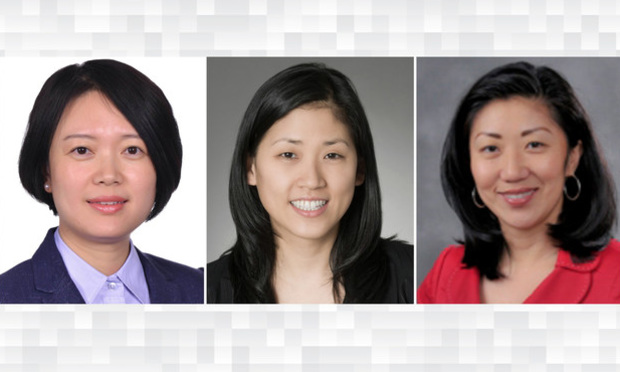The Careerist: Asian-American Women Are Filling the GC Suite
From the Fortune 500 to patriarchal China, progress is evident for women of Asian descent. What makes in-house work more inviting?
April 03, 2018 at 11:53 AM
4 minute read
 Hannah Cao, Jean Lee and Clara Ohr
Hannah Cao, Jean Lee and Clara Ohr
Almost every Asian-American female lawyer I know has been told at some point that she's too polite, demure or petite to be effective at her job. “How can anyone see you in a courtroom?” asked one of my ex-boyfriends when I started practicing law. “You're tiny.”
Despite putting up with such nonsense, female lawyers of Asian descent are on a tear—particularly in corporations. Of the 20 Asian-American lawyers now heading the legal departments of Fortune 500 companies, eight are women. And in China, where patriarchy rules and boys are still favored, over 50 percent of general counsel are women, reports legal consulting firm Acritas.
It all might be a momentary high, but it's stirring excitement.
“It's only in the past 18 months that we see a significant increase of APA [Asian Pacific American] women among GCs in the Fortune 500,” says Jean Lee, head of the Minority Corporate Counsel Association. “It's the first time that APA women actually are not at the bottom for the top job.”
So why the sudden spike in the number of Asian women in top positions in companies?
“They certainly face the same issues that other non-APA women face in the legal world at large,” says recruiter Selena Loh LaCroix, who was senior counsel at Texas Instruments and now is global leader of the technology and communications practice at consultancy Egon Zehnder.
Indeed, APA women face a unique package of stereotypes: Asian nerd, traditional female, plus a dash of Oriental exoticism. According to a 2017 study by Yale Law School and the National Asian Pacific American Bar Association, APA women reported more overt racism (32 percent vs. 26 percent) and implicit discrimination (61 percent vs. 53 percent) than APA men. Moreover, they cited family demands and lack of work recognition as key obstacles in their careers.
Yet, some have thrived in corporations in ways they didn't in firms.
“Law firms are one-dimensional,” says Linda Lu, a senior vice president at Nationwide Insurance Co. ”They are about bringing in business, which doesn't play to our strengths.” She says she finds that corporations “are more holistic and take factors like emotional intelligence into consideration.”
Caroline Tsai, the new GC of Western Union, has found working in-house liberating, professionally and personally. A former Jones Day associate, Tsai started her in-house career at Bank of America in 2005 just when the bank went into crisis mode.
“There was not one day where I didn't feel, 'Wow, I don't know the answer,'” she says. But she found that thrilling. “A law firm gives you training, but in-house teaches you leadership.”
Tsai also says she can now push for diversity.
“When I was at Jones Day, I didn't want to be known as an Asian-American lawyer,” she says.
But when she went in-house, she joined the women's affinity group and became a leader in diversity efforts.
“There's more inclusion and talent development in-house,” she says. “And you can make a difference.”
Hannah Cao, the GC of Silk Road Fund, a $40 billion infrastructure fund based in Beijing, finds she's now given more credibility. She's worked at several American firms in New York and China (Coudert Brothers, O'Melveny & Myers, Schulte Roth & Zabel and Steptoe & Johnson), and she says she found the same bias. “You are asked if you're tough enough, smart enough, and if you have a clear mental state,” she says. And once she had kids, Cao says, “Firms questioned my commitment, and when I told them I would not sacrifice my family to be a partner, they basically said I could move on.” (The chair of Silk Road is a woman.)
While these women find in-house work to be a more welcoming environment, none of them is working a cushy job. The difference is they don't feel that their skills or dedication are called into question.
So does that mean the old stereotypes and biases don't exist as much in-house? That's premature, says Clara Ohr, GC of East Coast Energy Group.
“While I think we have made some good advances in recent years, I do not believe that the tide has turned for female APA GCs, or APAs generally,” she says. Asians, she says, are still stereotyped as “hardworking but docile worker bees.”
That said, some APA women don't seem to be constrained by the stereotype.
“I never defined myself as either a dragon lady or a lotus blossom,” Tsai says. “I'm agile. I still think like an immigrant.”
This content has been archived. It is available through our partners, LexisNexis® and Bloomberg Law.
To view this content, please continue to their sites.
Not a Lexis Subscriber?
Subscribe Now
Not a Bloomberg Law Subscriber?
Subscribe Now
NOT FOR REPRINT
© 2025 ALM Global, LLC, All Rights Reserved. Request academic re-use from www.copyright.com. All other uses, submit a request to [email protected]. For more information visit Asset & Logo Licensing.
You Might Like
View All

Trending Stories
- 1How ‘Bilateral Tapping’ Can Help with Stress and Anxiety
- 2How Law Firms Can Make Business Services a Performance Champion
- 3'Digital Mindset': Hogan Lovells' New Global Managing Partner for Digitalization
- 4Silk Road Founder Ross Ulbricht Has New York Sentence Pardoned by Trump
- 5Settlement Allows Spouses of U.S. Citizens to Reopen Removal Proceedings
Who Got The Work
J. Brugh Lower of Gibbons has entered an appearance for industrial equipment supplier Devco Corporation in a pending trademark infringement lawsuit. The suit, accusing the defendant of selling knock-off Graco products, was filed Dec. 18 in New Jersey District Court by Rivkin Radler on behalf of Graco Inc. and Graco Minnesota. The case, assigned to U.S. District Judge Zahid N. Quraishi, is 3:24-cv-11294, Graco Inc. et al v. Devco Corporation.
Who Got The Work
Rebecca Maller-Stein and Kent A. Yalowitz of Arnold & Porter Kaye Scholer have entered their appearances for Hanaco Venture Capital and its executives, Lior Prosor and David Frankel, in a pending securities lawsuit. The action, filed on Dec. 24 in New York Southern District Court by Zell, Aron & Co. on behalf of Goldeneye Advisors, accuses the defendants of negligently and fraudulently managing the plaintiff's $1 million investment. The case, assigned to U.S. District Judge Vernon S. Broderick, is 1:24-cv-09918, Goldeneye Advisors, LLC v. Hanaco Venture Capital, Ltd. et al.
Who Got The Work
Attorneys from A&O Shearman has stepped in as defense counsel for Toronto-Dominion Bank and other defendants in a pending securities class action. The suit, filed Dec. 11 in New York Southern District Court by Bleichmar Fonti & Auld, accuses the defendants of concealing the bank's 'pervasive' deficiencies in regards to its compliance with the Bank Secrecy Act and the quality of its anti-money laundering controls. The case, assigned to U.S. District Judge Arun Subramanian, is 1:24-cv-09445, Gonzalez v. The Toronto-Dominion Bank et al.
Who Got The Work
Crown Castle International, a Pennsylvania company providing shared communications infrastructure, has turned to Luke D. Wolf of Gordon Rees Scully Mansukhani to fend off a pending breach-of-contract lawsuit. The court action, filed Nov. 25 in Michigan Eastern District Court by Hooper Hathaway PC on behalf of The Town Residences LLC, accuses Crown Castle of failing to transfer approximately $30,000 in utility payments from T-Mobile in breach of a roof-top lease and assignment agreement. The case, assigned to U.S. District Judge Susan K. Declercq, is 2:24-cv-13131, The Town Residences LLC v. T-Mobile US, Inc. et al.
Who Got The Work
Wilfred P. Coronato and Daniel M. Schwartz of McCarter & English have stepped in as defense counsel to Electrolux Home Products Inc. in a pending product liability lawsuit. The court action, filed Nov. 26 in New York Eastern District Court by Poulos Lopiccolo PC and Nagel Rice LLP on behalf of David Stern, alleges that the defendant's refrigerators’ drawers and shelving repeatedly break and fall apart within months after purchase. The case, assigned to U.S. District Judge Joan M. Azrack, is 2:24-cv-08204, Stern v. Electrolux Home Products, Inc.
Featured Firms
Law Offices of Gary Martin Hays & Associates, P.C.
(470) 294-1674
Law Offices of Mark E. Salomone
(857) 444-6468
Smith & Hassler
(713) 739-1250











